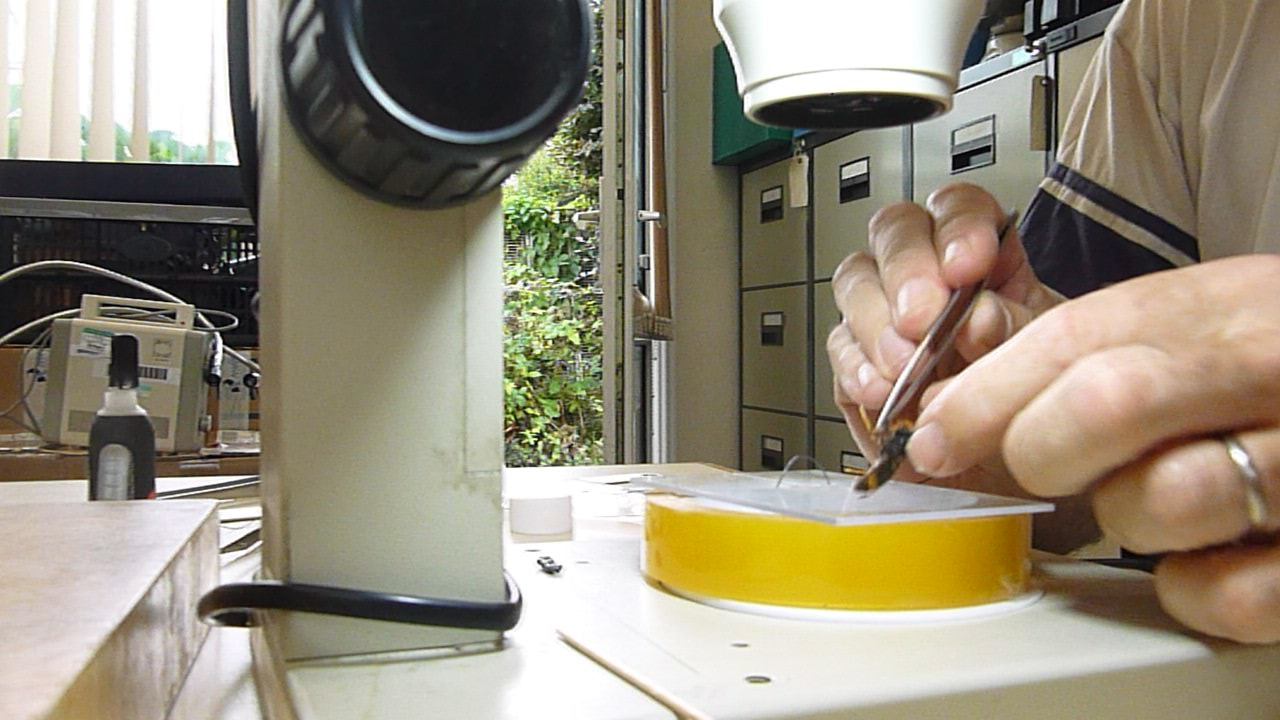|
SBKA member Lynne Ingram reports from the front line fighting Asian hornets in Jersey:
Day 2 – Training – and a disappointment We were up early checking hornet traps around the Clubley Estate area, and found a number of really big hornets in two of the traps. We gathered some of these to tag and release later. We then headed to the Department of the Environment so that we could be trained in how to attach tags to hornets, and how to use radio telemetry to track the tagged hornets. Peter Kennedy and Jess Knapp from Exeter University, who have been in Jersey for a couple of weeks, were doing the training. We divided into two groups, and I started with radio telemetry. The equipment consists of a receiver that you hang round your neck, and an attached aerial that you carry and move to increase signal, or to identify the direction of your target. Firstly you match your tag to your receiver, and fine-tune things, before attaching your aerial. The tag emits a regular signal that you can hear, and as you get nearer to your target you can increase sensitivity, allowing you to close in precisely. We went out to practice after Jess had hidden the tag in trees and hedges. It took a bit of getting used to but we managed to track the tags, and it was clear that radio telemetry is a really useful tool in the search for Asian Hornets. Yesterday’s nest find was a good example of its successful use. My next session was learning how to tag the hornets - luckily we practiced on dead ones! Before tagging, the hornets are weighed to make sure that they are sturdy enough to carry the tag (350-400mg). Live hornets are generally not that keen on having a tag tied around their middle, so the first stage is to chill them in ice for 10 minutes. This knocks them out enough for you to secure them to a small perspex plate with a couple of slots cut out, so that you can tie the tag around their petiole. The plate means that the hornet is secured on one side, while you work on the other side – well away from the sting! It is quite fiddly, and you are trying to work as quickly as you can before the hornet comes round. Practice does make perfect and Peter was able to tag a live hornet in a few minutes. The tag weighs between 230mg and 280mg and has a 10cm antenna, so it is a huge weight for the hornet to carry. After a short while the hornet comes to, and starts moving around, fanning its wings, and trying to gnaw at things. It is at this point that you are trying to glue a coloured number to it’s thorax, so tricky work! Once this is done, the hornet is released from the plate into a small, then bigger flight cage, so that she can warm up and get used to the tag. In the afternoon, we took the two tagged hornets from the Clubley Estate back to be released and then followed, hopefully, to the nest. This proved to be an extremely difficult task as the buildings interfered with the radio signals, and also made it tricky to follow the hornets directly. Peter and Jess had an aerial each so they could follow both hornets, and local homeowners allowed us to enter gardens and back yards to get better views or angles for the aerials. After some hours we had followed one hornet to a tree in an area previously identified as a likely nest spot, and had a strong and precise signal from her, but were unable to locate her or a nest. We had a weak signal from the other one. We had to call it a day as it was getting late, but Peter resumed the search in the morning, and unfortunately found both hornets dead – perhaps from cold or exhaustion. It was disappointing after everyones hard work, but we learnt a lot from the experience. Here is a link to Peter’s research: https://www.nature.com/articles/s42003-018-0092-9.pdf Comments are closed.
|
Archives
March 2024
Categories
All
|
Somerset Beekeepers Association Charity © 2021 Registered CIO Charity 1206483
Affiliated to the British Beekeepers Association
Click here to view our Privacy Policy
Affiliated to the British Beekeepers Association
Click here to view our Privacy Policy

 RSS Feed
RSS Feed
